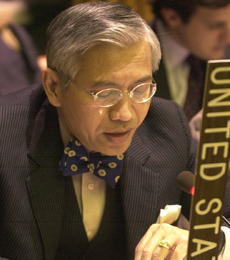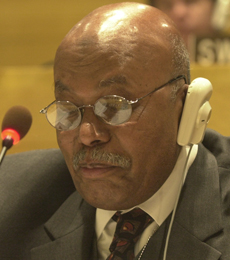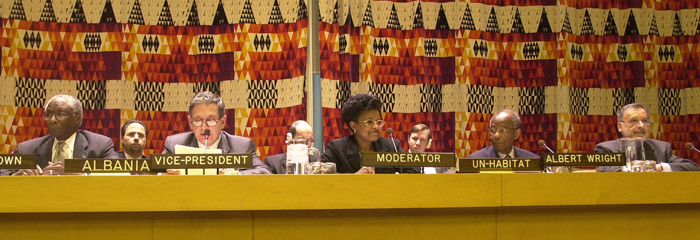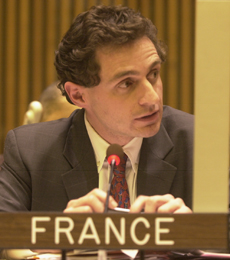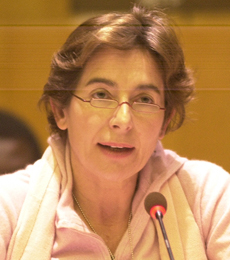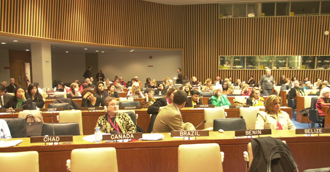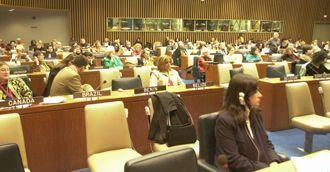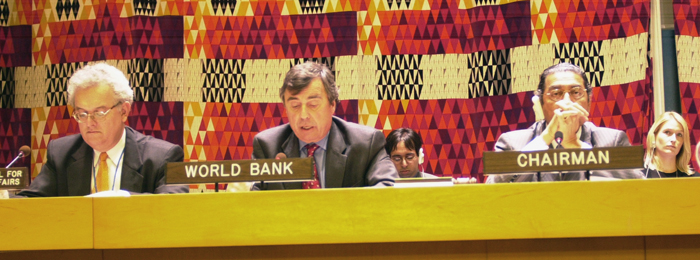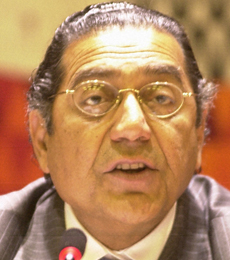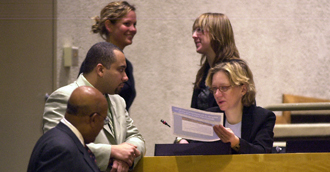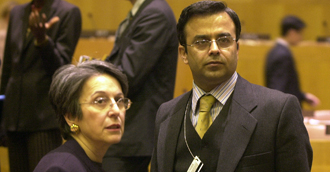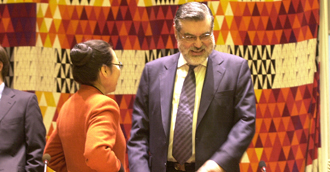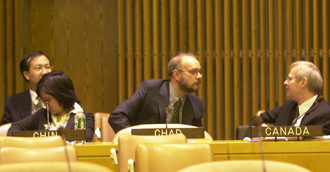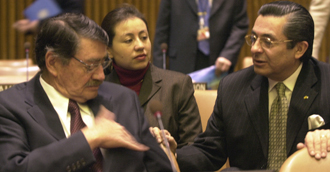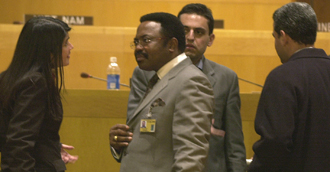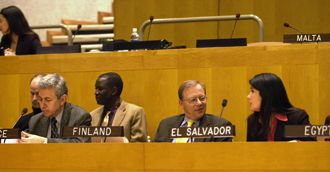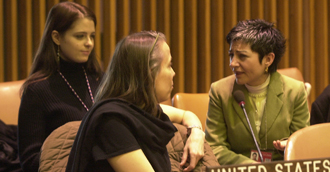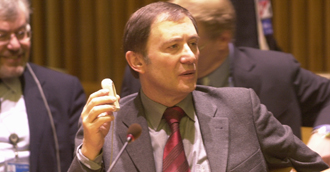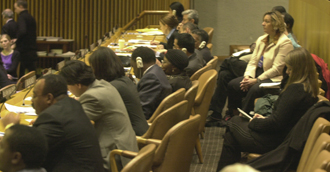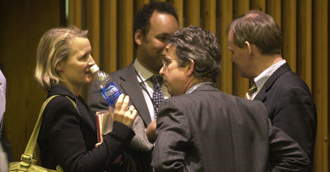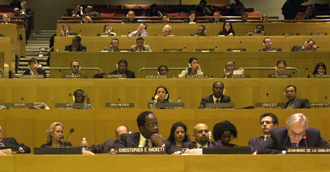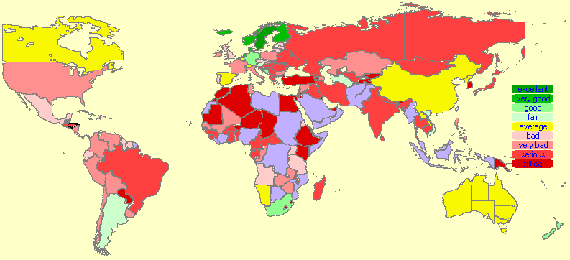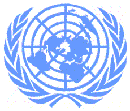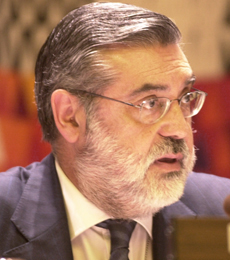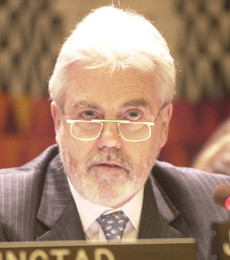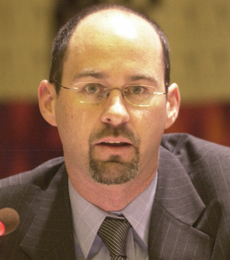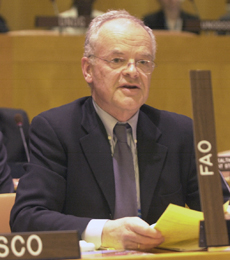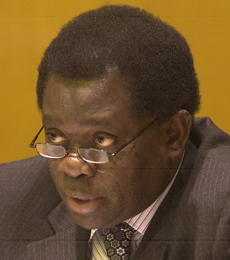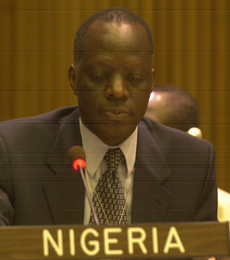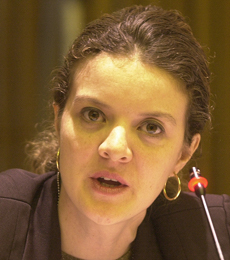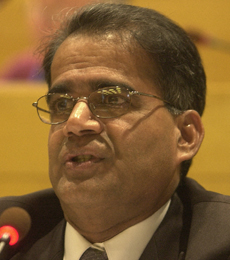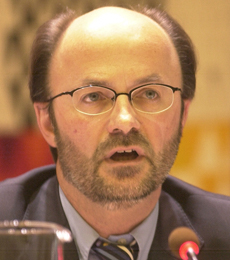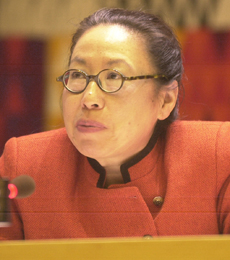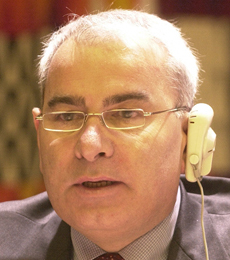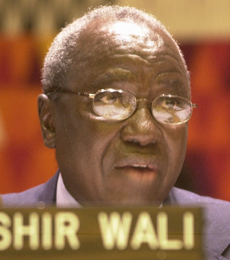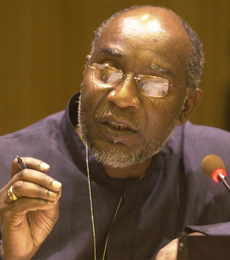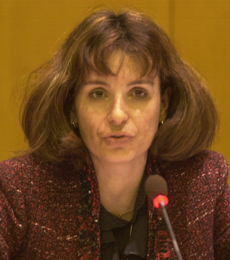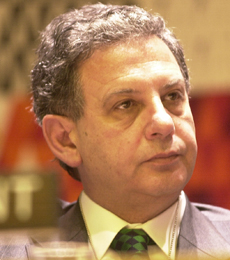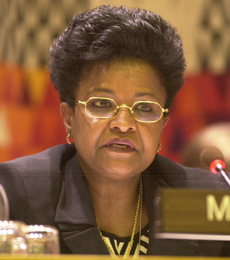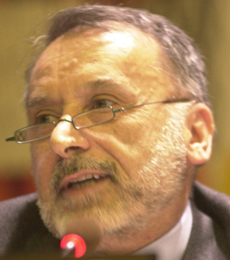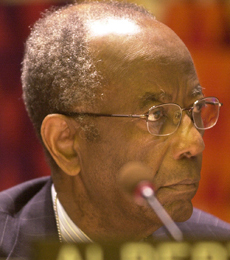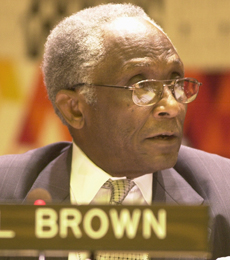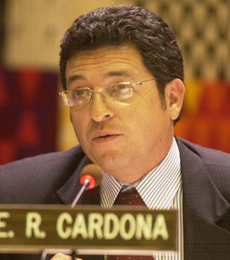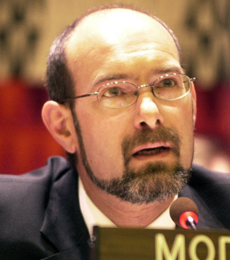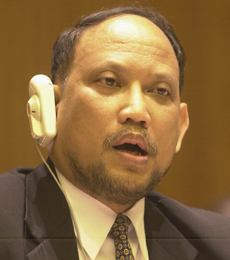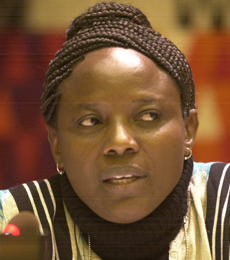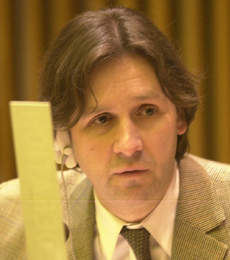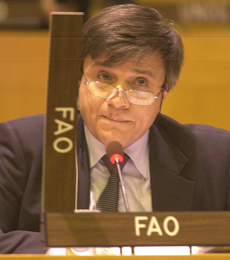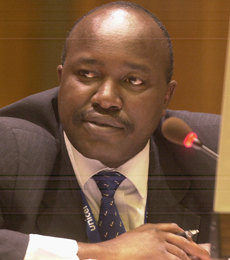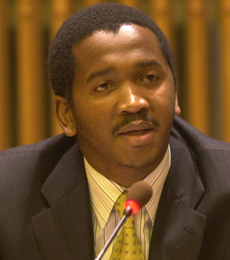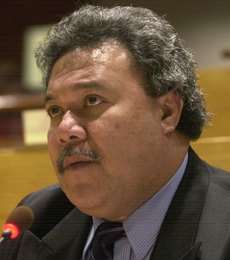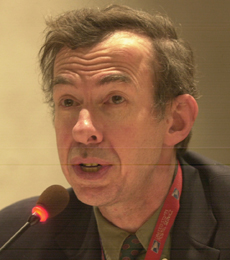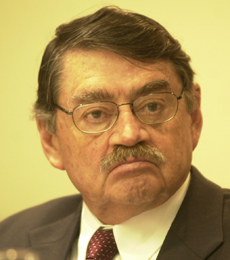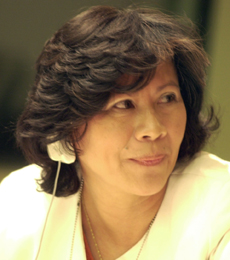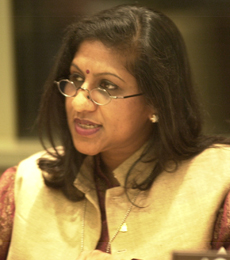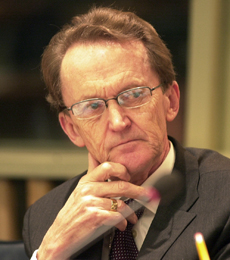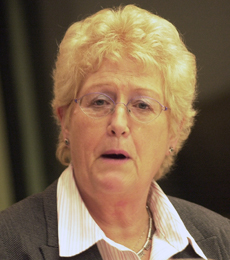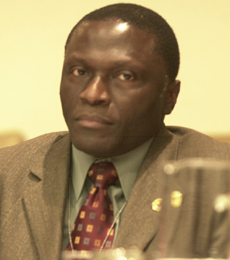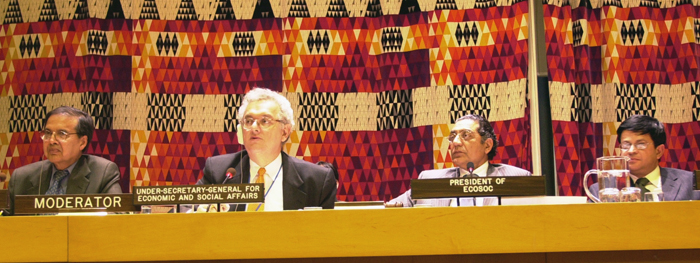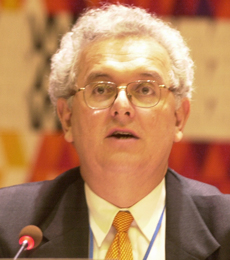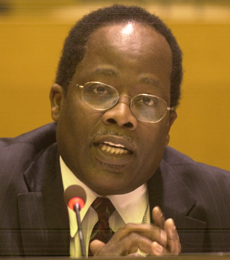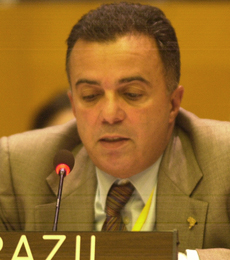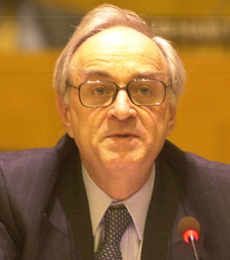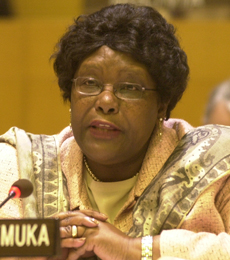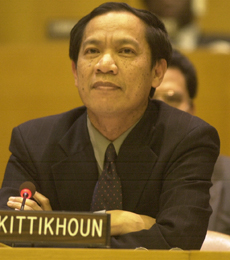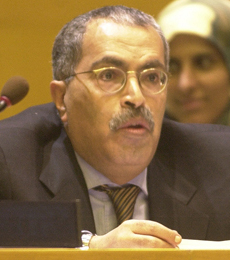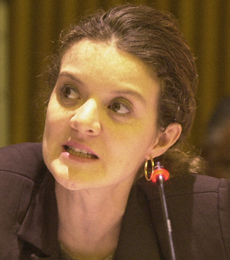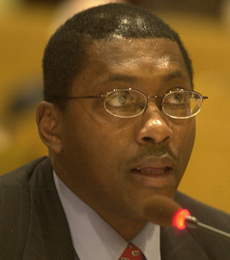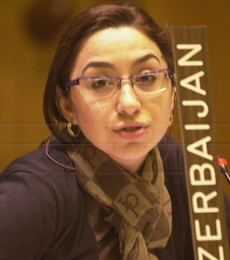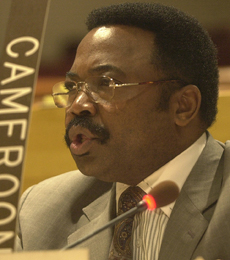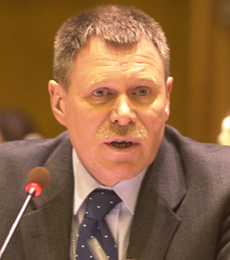|
 WSSD (26 August - 4 September 2002,
Johannesburg,
South Africa) WSSD (26 August - 4 September 2002,
Johannesburg,
South Africa)
 WSSD PrepCom IV (25 May - 7 June 2002,
Bali,
Indonesia) WSSD PrepCom IV (25 May - 7 June 2002,
Bali,
Indonesia)
 WSSD PrepCom III (25 March - 5 April 2002,
New York) WSSD PrepCom III (25 March - 5 April 2002,
New York)
 WSSD PrepCom II (28 January - 8 February 2002,
New York) WSSD PrepCom II (28 January - 8 February 2002,
New York)
 WSSD PrepCom Informal Brainstorming Session (16-17 January 2002, UN headquarters,
New York) WSSD PrepCom Informal Brainstorming Session (16-17 January 2002, UN headquarters,
New York)
 WSSD Asia-Pacific Regional Preparatory Meeting (27-29 November 2001,
Phnom Penh,
Cambodia) WSSD Asia-Pacific Regional Preparatory Meeting (27-29 November 2001,
Phnom Penh,
Cambodia)
 WSSD West Asia Regional Preparatory Meeting (24 October 2001,
Cairo,
Egypt) WSSD West Asia Regional Preparatory Meeting (24 October 2001,
Cairo,
Egypt)
 WSSD LAC Regional Preparatory Meeting (23-24 October 2001,
Rio de Janeiro,
Brazil) WSSD LAC Regional Preparatory Meeting (23-24 October 2001,
Rio de Janeiro,
Brazil)
 WSSD African Regional Preparatory Meeting (15-18 October 2001,
Nairobi,
Kenya) WSSD African Regional Preparatory Meeting (15-18 October 2001,
Nairobi,
Kenya)
 WSSD ECE Regional Preparatory Meeting (24-25 September 2001,
Geneva,
Switzerland) WSSD ECE Regional Preparatory Meeting (24-25 September 2001,
Geneva,
Switzerland)
 WSSD International Eminent Persons Meeting on Interlinkages Bridging Problems and Solutions to Work Towards Sustainable Development (3-4 September 2001,
Tokyo,
Japan) WSSD International Eminent Persons Meeting on Interlinkages Bridging Problems and Solutions to Work Towards Sustainable Development (3-4 September 2001,
Tokyo,
Japan)
 WSSD PrepCom I (30 April - 2 May 2001,
New York) WSSD PrepCom I (30 April - 2 May 2001,
New York)
Earth
Summit
+5
 UNCED (3-14 June 1992,
Rio de Janeiro,
Brazil) UNCED (3-14 June 1992,
Rio de Janeiro,
Brazil)
 PrepCom IV UNCED (2 March - 4 April 1992,
New York) PrepCom IV UNCED (2 March - 4 April 1992,
New York)
Small
Island
Developing States (SIDS)
 Mauritius International Meeting (10-14 January 2005,
Port Louis,
Mauritius) Mauritius International Meeting (10-14 January 2005,
Port Louis,
Mauritius)
 BPOA+10 second round of informal informal consultations briefing note (7,8 and 11 October 2004, UN headquarters,
New York) BPOA+10 second round of informal informal consultations briefing note (7,8 and 11 October 2004, UN headquarters,
New York)
 BPOA+10 Informal Informal Consultations Briefing Note (17-19 May 2004, UN headquarters,
New York) BPOA+10 Informal Informal Consultations Briefing Note (17-19 May 2004, UN headquarters,
New York)
 SIDS Preparatory Meeting for BPoA +10 (14-16 April 2004, UN headquarters,
New York) SIDS Preparatory Meeting for BPoA +10 (14-16 April 2004, UN headquarters,
New York)
 BPOA+10 PrepCom Briefing Note (15 March 2004, UN headquarters,
New York) BPOA+10 PrepCom Briefing Note (15 March 2004, UN headquarters,
New York)
 SIDS Inter-regional Preparatory Meeting for the 10-year Review of the BPOA (26-30 January 2004,
Nassau,
Bahamas) SIDS Inter-regional Preparatory Meeting for the 10-year Review of the BPOA (26-30 January 2004,
Nassau,
Bahamas)
 UNGASS Review and Appraisal of Implementation of Programme of Action for the Sustainable Development of SIDS (27-28 September 1999, UNHQ,
New York) UNGASS Review and Appraisal of Implementation of Programme of Action for the Sustainable Development of SIDS (27-28 September 1999, UNHQ,
New York)
 Global Conference on the Sustainable Development of SIDS (25 April - 6 May 1994,
Barbados) Global Conference on the Sustainable Development of SIDS (25 April - 6 May 1994,
Barbados)
Disaster Reduction
 World Conference on Disaster Reduction (18-22 January 2005,
Kobe-Hyogo,
Japan) World Conference on Disaster Reduction (18-22 January 2005,
Kobe-Hyogo,
Japan)
 World Conference on Disaster Reduction PrepCom2 (11-12 October 2004,
Geneva,
Switzerland) World Conference on Disaster Reduction PrepCom2 (11-12 October 2004,
Geneva,
Switzerland)
 World Conference on Disaster Reduction PrepCom1 (6-7 May 2004,
Geneva,
Switzerland) World Conference on Disaster Reduction PrepCom1 (6-7 May 2004,
Geneva,
Switzerland)
Human Settlements
 25th Special Session of the UN General Assembly (Istanbul+5) for an Overall Review and Appraisal of the Implementation of the Habitat Agenda (6-8 June 2001, UNHQ,
New York) 25th Special Session of the UN General Assembly (Istanbul+5) for an Overall Review and Appraisal of the Implementation of the Habitat Agenda (6-8 June 2001, UNHQ,
New York)
 Second PrepCom for UN General Assembly for an Overall Review and Appraisal of the Implementation of the Habitat Agenda (19-23 February 2001,
Nairobi,
Kenya) Second PrepCom for UN General Assembly for an Overall Review and Appraisal of the Implementation of the Habitat Agenda (19-23 February 2001,
Nairobi,
Kenya)
 Second UN Conference on Human Settlements (Habitat II) (3-14 June 1996,
Istanbul,
Turkey) Second UN Conference on Human Settlements (Habitat II) (3-14 June 1996,
Istanbul,
Turkey)
 Third substantive session of the Habitat II PrepCom (5-16 February 1996, UNHQ,
New York) Third substantive session of the Habitat II PrepCom (5-16 February 1996, UNHQ,
New York)
 Second substantive session of the Habitat II PrepCom (24 April - 5 May 1995,
Nairobi,
Kenya) Second substantive session of the Habitat II PrepCom (24 April - 5 May 1995,
Nairobi,
Kenya)
 First substantive session of the PrepCom for the Second UN Conference on Human Settlements (Habitat II) (11-22 April 1994,
Geneva,
Switzerland) First substantive session of the PrepCom for the Second UN Conference on Human Settlements (Habitat II) (11-22 April 1994,
Geneva,
Switzerland)
 ENB archives of Habitat meetings ENB archives of Habitat meetings
Social Development
 Twenty-first Special Session of the UN General Assembly (UNGASS-21) (30 June - 2 July 1999, UN headquarters,
New York) Twenty-first Special Session of the UN General Assembly (UNGASS-21) (30 June - 2 July 1999, UN headquarters,
New York)
 UN Commission on Population and Development Resumed Session of the ICPD+5 PrepCom (24-29 June 1999, UN headquarters,
New York) UN Commission on Population and Development Resumed Session of the ICPD+5 PrepCom (24-29 June 1999, UN headquarters,
New York)
 32nd Session of the UN Commission on Population and Development and ICPD +5 Preparatory Meeting (22-31 March 1999, UN headquarters,
New York) 32nd Session of the UN Commission on Population and Development and ICPD +5 Preparatory Meeting (22-31 March 1999, UN headquarters,
New York)
 The Hague Forum (8-12 February 1999,
The Hague,
The
Netherlands) The Hague Forum (8-12 February 1999,
The Hague,
The
Netherlands)
 United Nations International Conference on Population and Development (ICPD) (5-13 September 1994,
Cairo,
Egypt) United Nations International Conference on Population and Development (ICPD) (5-13 September 1994,
Cairo,
Egypt)
 ENB archives of ICPD meetings ENB archives of ICPD meetings
Women and Gender
 Beijing +10: Commission on the Status of Women (28 February - 11 March,
New York) Beijing +10: Commission on the Status of Women (28 February - 11 March,
New York)
 Copenhagen +10: Commission for Social Development (February,
New York) Copenhagen +10: Commission for Social Development (February,
New York)
 World Conference on Disaster Reduction (18-22 January,
Hyogo,
Japan) World Conference on Disaster Reduction (18-22 January,
Hyogo,
Japan)
 Small Island Developing States: 10 year review (10-14 January,
Mauritius) Small Island Developing States: 10 year review (10-14 January,
Mauritius)
2003
 World Summit on the Information Society Geneva Phase (10-12 December,
Geneva) World Summit on the Information Society Geneva Phase (10-12 December,
Geneva)
2002
 World Summit on Sustainable Development (26 August - 4 September,
Johannesburg) World Summit on Sustainable Development (26 August - 4 September,
Johannesburg)
 World Food Summit: five years later (10-13 June,
Rome) World Food Summit: five years later (10-13 June,
Rome)
 General Assembly Special Session on Children (8-10 May,
New York) General Assembly Special Session on Children (8-10 May,
New York)
 Second World Assembly on Ageing (8-12 April,
Madrid) Second World Assembly on Ageing (8-12 April,
Madrid)
 International Conference on Financing for Development (18-22 March,
Monterrey) International Conference on Financing for Development (18-22 March,
Monterrey)
2001
 World Conference against racism, racial discrimination, xenophobia and related intolerance World Conference against racism, racial discrimination, xenophobia and related intolerance
 Implementation of the outcome of the United Nations Conference on Human Settlements (Habitat II) (6-8 June,
New York) Implementation of the outcome of the United Nations Conference on Human Settlements (Habitat II) (6-8 June,
New York)
 Third United Nations Conference on the Least Developed Countries (14-20 May,
Brussels) Third United Nations Conference on the Least Developed Countries (14-20 May,
Brussels)
2000
 Millennium Summit (6-8 September,
New York) Millennium Summit (6-8 September,
New York)
 World Summit for Social Development and Beyond: Achieving Social Development for All in a Globalized World World Summit for Social Development and Beyond: Achieving Social Development for All in a Globalized World
 Review the implementation of the Nairobi Forward-looking Strategies for the Advancement of Women and of the Beijing Review the implementation of the Nairobi Forward-looking Strategies for the Advancement of Women and of the Beijing
1999
 Small Island Developing States (Special Session of the General Assembly, 27-28 September,
New York) Small Island Developing States (Special Session of the General Assembly, 27-28 September,
New York)
 International Conference on Population and Development [ICPD+5] (30 June - 2 July,
New York) International Conference on Population and Development [ICPD+5] (30 June - 2 July,
New York)
1997
 Earth Summit+5 (23-27 June,
New York) Earth Summit+5 (23-27 June,
New York)
1996
 Second United Nations Conference on Human Settlements (HABITAT II) (3-14 June,
Istanbul) Second United Nations Conference on Human Settlements (HABITAT II) (3-14 June,
Istanbul)
1995
 Fourth World Conference on Women (September,
Beijing) Fourth World Conference on Women (September,
Beijing)
 World Summit for Social Development (6-12 March,
Copenhagen) World Summit for Social Development (6-12 March,
Copenhagen)
1994
 Global Conference on Sustainable Development of Small Island Developing States (25 April - 6 May,
Barbados) Global Conference on Sustainable Development of Small Island Developing States (25 April - 6 May,
Barbados)
 International Conference on Population and Development (ICPD) (September,
Cairo) International Conference on Population and Development (ICPD) (September,
Cairo)
|
|
|
|
|
|
|
|
|
|


